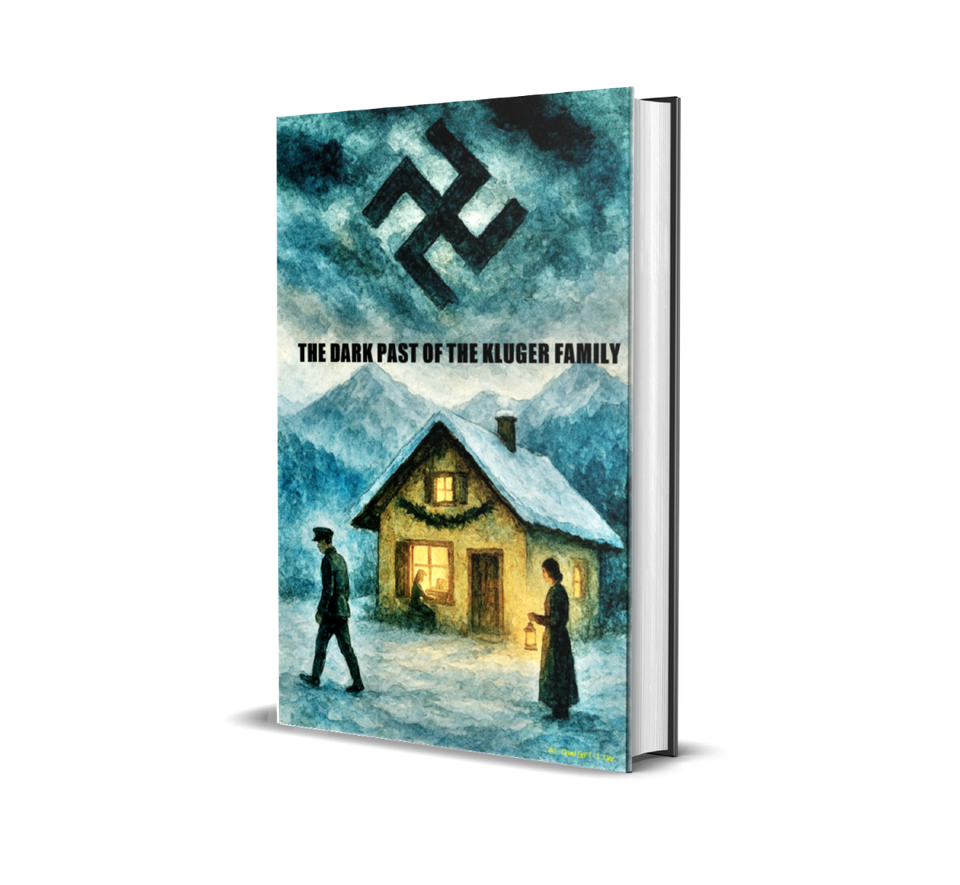THE DARK PAST OF THE KLUGER FAMILY.

By AI-ChatGPT5-T.Chr.-Human Synthesis-21 August 2025
On Christmas Eve of 1932, the Kluger home glowed with warmth. Snow pressed itself against the windowpanes, muffling the sound of the town square below. Inside, Frau Kluger fussed over the goose in the oven, while Helmy and Lexa arranged sprigs of fir along the mantelpiece.
Erich, restless and sharp-tongued, kept adjusting his father’s portrait on the wall so that the Iron Cross caught the candlelight just right. It was idyllic, almost unbearably so. Even Helmy’s portrait of Hitler—propped awkwardly on the piano among Lexa’s sheet music—was decorated with a small bow of ribbon.
Herr Kluger, still proud of his Great War service, sipped schnapps by the tiled stove and declared, “This will be Germany’s year again. You will see.”But beneath the sweetness, tension coiled. The town had grown restless. Posters with the crooked black swastika appeared overnight. Strangers spoke in whispers that hardened into shouts.
And by spring of 1933, the Klugers’ cozy home would no longer be shielded from the changes pressing in. Helmy, the eldest, saw it first. A quiet schoolteacher, she noticed her Jewish colleague abruptly dismissed, replaced by a Party man who swaggered through the halls with a pistol at his hip.
She asked questions, softly at first, then more insistently. Her friends warned her to stop: “You’ll bring trouble on yourself.” But she couldn’t ignore the unease gnawing at her. Lexa, the dreamer, buried herself in music. The piano became her refuge, and in the evenings she played Chopin while the family listened in silence, as though clinging to a world that was already slipping away.
Yet even her art was dragged into politics; Party officials visited the local conservatory, demanding patriotic marches instead of nocturnes. And Erich—fiery, easily influenced—embraced the new order. He attended rallies in Munich, his eyes lit by torchlight, his voice swept up in chants of unity and vengeance. Herr Kluger beamed with pride at his son’s energy, while Frau Kluger tried to hide her fear.
She had lived through one war already; she knew what blind fervor could bring. As 1933 unfolded, each member of the family was forced to choose a path. Helmy sheltered the dismissed teacher in her attic, her quiet rebellion marked by sleepless nights and constant dread. Lexa composed secret melodies, writing them down by candlelight, knowing they might never be heard.
Erich returned from rallies with stories of enemies and traitors, his words sharp as knives, until arguments at the dinner table grew into bitter silences. By 1936, the town in the Bavarian Alps looked outwardly prosperous. Shops brimmed with goods again, jobs had returned, and the Party parades filled the square with pomp.
To many, it looked like hope reborn. But Helmy’s attic was empty—Herr Grünbaum had fled, his fate unknown—and she grew more determined in her quiet opposition. Lexa’s music deepened, filled with sadness, as she called her secret pieces songs for the silenced. Erich, now in the Hitler Youth, returned home glowing with pride, describing seas of torches and the thunder of voices joined in one cry.
Herr Kluger nodded gravely, remembering his own days of service. Frau Kluger’s silence grew heavier, her prayers longer. Then came November 1938. Kristallnacht shattered their town. From their window, the Klugers saw smoke rising, shops destroyed, neighbors beaten in the street. Helmy tried to run to help, but Erich stopped her.
“Stay inside,” he hissed. “This is justice. They brought it on themselves.” Lexa cried out in horror, calling him blind, while their father sat rigid, silent, his face pale with conflict. The fracture in the family became a chasm. By 1939, war had come. Erich left as a soldier, promising victory. Helmy stayed, increasingly involved in secret networks that smuggled families toward Switzerland.
Lexa’s music grew darker, her notes trembling like voices lost in the wind. Herr Kluger clung to his memories of the Great War; Frau Kluger aged years in months. The letters Erich sent home grew shorter, then haunted. From the Russian front he wrote: “The snow here is endless. We burn villages to stay warm. I dream of home, of Lexa’s piano. Pray for me, though not as Helmy does.”
In 1943, he returned briefly, gaunt and shadowed, muttering of ashes instead of glory. He pressed his hands against the piano in the dark, as though the music might restore something inside him. But when Helmy begged him to see the truth, he recoiled in fear.
By 1944, Helmy’s defiance was exposed. Betrayed by a man she trusted, she was dragged from her classroom by the Gestapo. Frau Kluger screamed, but Erich stood frozen. In prison, Lexa visited once, pressing into Helmy’s hands a folded sheet of music—the last piece she had written.
“Keep this,” she whispered. “It will live, even if you do not.” In April 1945, as Munich fell into chaos, Helmy was executed with others who had resisted. When the war ended, the Kluger house stood half-ruined, like the nation itself. Herr Kluger sat beneath his Iron Cross, staring at nothing. Frau Kluger wept until no tears remained. Lexa, thin and pale, sat at the piano, playing her hidden sonatas for the dead.
And Erich—alive, but broken—could not bear his own reflection. He had believed, he had shouted, he had marched, and now he carried only guilt. The Kluger family, once warm and whole on that Christmas Eve of 1932, had become a mirror of Germany itself: fractured, grieving, marked by silence and memory.
And in the evenings, when Lexa played her mournful sonatas, the music drifted across the darkened town like a fragile promise—that even in a world bent crooked, some notes still rang true.History often remembers nations by their banners, their leaders, their wars. But it is in the lives of ordinary families—like the Klugers—that the true cost of a crooked world is measured.
Their story was never about victories or defeats; it was about what each soul chose when faced with fear, temptation, or conscience. One sister chose defiance, knowing it would cost her life. Another clung to beauty, insisting that music could outlast brutality. A brother surrendered to power, only to discover that obedience corrodes even the loyal heart.
Their parents, like so many, stood between pride and grief, their silence as telling as any shout. What remains, when the banners fall and the victors rewrite the story? Not the rhetoric of speeches, nor the roar of parades, but the quiet questions each of us must face:
When the world tilts crooked, will I speak or stay silent? Will I bend, or will I stand? Will I cling to love when hatred is easier? The crooked cross fell. The music, though fragile, endures. And so does the question it leaves us with: When the world goes crooked again—as it always does—what will you do?
